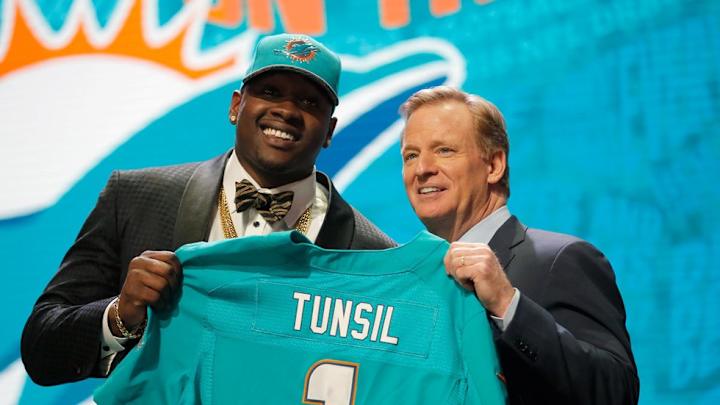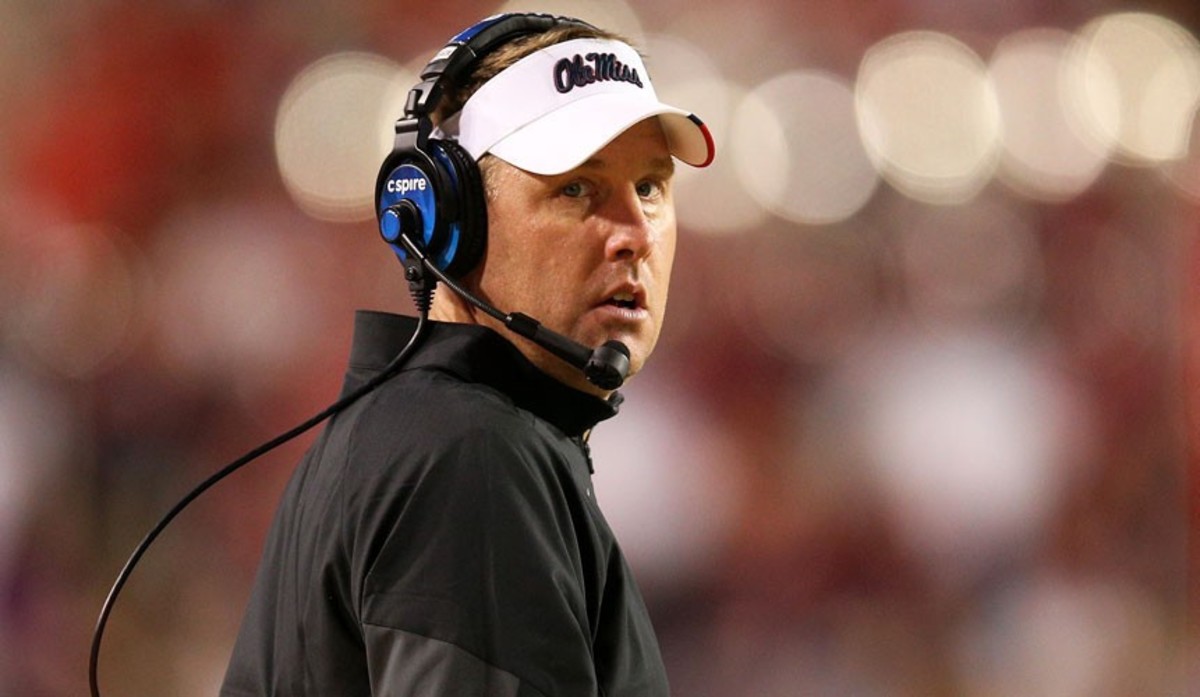Debacle on draft night: Laremy Tunsil's admission, and what it means in the current college sports landscape

[video: 13724913]
CHICAGO — It was easy to get swept up in it all, in the swirl of excitement that followed the moment when we all realized we had heard what we thought we did. It was easy to chase, to ask to repeat, to behave as if the world was burning down.
Maybe it's that we don't expect honesty. Maybe it's that we thought Laremy Tunsil knew better. But just seconds after denying knowledge of the text messages posted to his hacked Instagram account—they showed an alleged conversation in which he accepted money from Ole Miss's assistant athletic director for football operations to pay bills—the former Rebels offensive tackle backtracked. Asked again if he ever received money from the program, he admitted: "I have to say, yeah."
Those words came barely six months after the No. 13 pick in the 2016 NFL draft missed the first seven games of the '15 season for receiving impermissible benefits, and not three months after the NCAA cited Ole Miss's football program for 13 rules violations. They came just about an hour after a hacker posted an old video of Tunsil taking a hit from a bong to his Twitter page. Pause for a second to digest that. Crack a weed joke. Argue about college athletes and why they should or shouldn't get paid. It has been a hell of a night—a hell of a year, really—for Tunsil, who now has on his so-called rap sheet every issue the NCAA cares about 7,000 times more than the rest of us.
KAPLAN: Behind the scenes of Laremy Tunsil's NFL draft nightmare
Maybe Thursday night shouldn't have been a surprise. But it certainly was a spectacle.
Within a minute of the admission, Amy Milam, who works with the tackle's agent, Jimmy Sexton, appeared on the platform next to the Miami Dolphins' first-round pick and interrupted the line of questioning. She led Tunsil off the stage, and then the frenzy began. Reporters knocked over chairs scrambling to their laptops, journalism's closest approximation of the running of the bulls. Meanwhile, Tunsil disappeared behind double wooden doors. Did he really say that? Did he really?
Yes, he did, but frankly, it doesn't matter. At least not in the way it once might have. Tunsil probably lost in the neighborhood of $10 million after the video of him with the bong surfaced (the NFL and marijuana have not caught up to 2016, but their relationship is creeping toward modernity), but he will likely see little effect on his career from what he revealed during the press conference. It's unlikely the Dolphins care about the source of their future star tackle's rent checks as long as they were obtained without anyone getting hurt.

Chris Graythen/Getty Images
The real loser here is Ole Miss football under coach Hugh Freeze, which for months has been subject to scrutiny. Too quickly, a team that won a combined seven SEC games from 2010–13 became a powerhouse contending for division titles, and any time a program turns around so suddenly and with such a high caliber of players, the NCAA is likely to come a-calling. Tunsil's words on Thursday night, while said in a confusing haste—he'd had a minimal amount of time to process that the entirety of his social media had been hacked on the biggest night of his life—were something close to concrete evidence of wrongdoing. Now, even if the Rebels don't face retroactive repercussions, Freeze's job recruiting future classes just became immensely more difficult. As quickly as Ole Miss ascended into college football's upper echelon, it could drop back to the bottom of its conference.
Still, it's ridiculous, really, the tizzy we worked ourselves into at Tunsil's admission. His representatives hustled him away from the media with an urgency that suggested a far worse "crime" than making ends meet. Cheating in college athletics happens. It's rampant. But it's usually unveiled in the form of some arcane NCAA memo that vacates wins and docks scholarships, not by a player shrugging and copping to the whole deal—all while talking about how blessed he is. If Thursday's saga made any larger statement, it's about perception. We were shocked Tunsil admitted to getting paid, but we weren't shocked it happened.
FARRAR: Grading each pick from the first round of the 2016 NFL draft
So, here we stand: a newly minted NFL player whose worst crime was not knowing when to hem and haw rather than tell the truth; a program that was already doused in lighter fluid now set on fire; an agent, Sexton, who represents both the coach in flames and the player who threw the match; social media reinforcing just how terrifying it can be—and a bong. Tunsil is on the Dolphins. They will teach him when to keep his mouth shut. Ole Miss, however, has no such escape.
The NCAA's rules often render players helpless, with its antiquated guidelines shrouded under the guise of amateurism. But Thursday was different. Tunsil suffered consequences at the draft because of marijuana, not because of his leaked text messages, and he'll enter the NFL with a better idea of the scrutiny he will face and the guards he will need to put up around his life. For Ole Miss, though, the ramifications of those five words remain to be seen.
